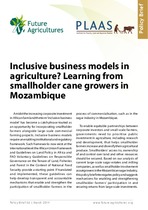| dc.contributor.author | Sulle, Emmanuel | |
| dc.contributor.author | Hall, Ruth | |
| dc.contributor.author | Paradza, Gaynor | |
| dc.date.accessioned | 2019-03-01T09:41:06Z | |
| dc.date.available | 2019-03-01T09:41:06Z | |
| dc.date.issued | 2014 | |
| dc.identifier.citation | Hall, R. et al. (2014). Inclusive business models in agriculture? Learning from smallholder cane growers in Mozambique. Policy Brief 66, Bellville: Institute for Poverty, Land and Agrarian Studies, University of the Western Cape | en_US |
| dc.identifier.uri | http://hdl.handle.net/10566/4313 | |
| dc.description.abstract | Amidst the increasing corporate investment in African farmland the term ‘inclusive business model’ has become a catchphrase touted as an opportunity for incorporating smallholder farmers alongside large-scale commercial farming projects. Inclusive business models require an enabling institutional and regulatory framework. Such frameworks now exist at the international level: the African Union Framework and Guidelines on Land Policy in Africa and FAO Voluntary Guidelines on Responsible Governance on the Tenure of Land, Fisheries and Forest in the Context of National Food Security provide a starting point. If translated and implemented, these guidelines can help develop transparent and accountable mechanisms that enable and strengthen the participation of smallholder farmers in the process of commercialisation, such as in the sugar industry in Mozambique. | en_US |
| dc.language.iso | en | en_US |
| dc.publisher | Institute for Poverty, Land and Agrarian Studies, University of the Western Cape | en_US |
| dc.relation.ispartofseries | Policy Brief: Future Agricultures Consortium;66 | |
| dc.subject | Mozambique | en_US |
| dc.subject | Commercial farming | en_US |
| dc.subject | Smallholder farmers | en_US |
| dc.subject | Sugar industry | en_US |
| dc.subject | Inclusive business models | en_US |
| dc.title | Inclusive business models in agriculture? Learning from smallholder cane growers in Mozambique | en_US |
| dc.type | Other | en_US |

